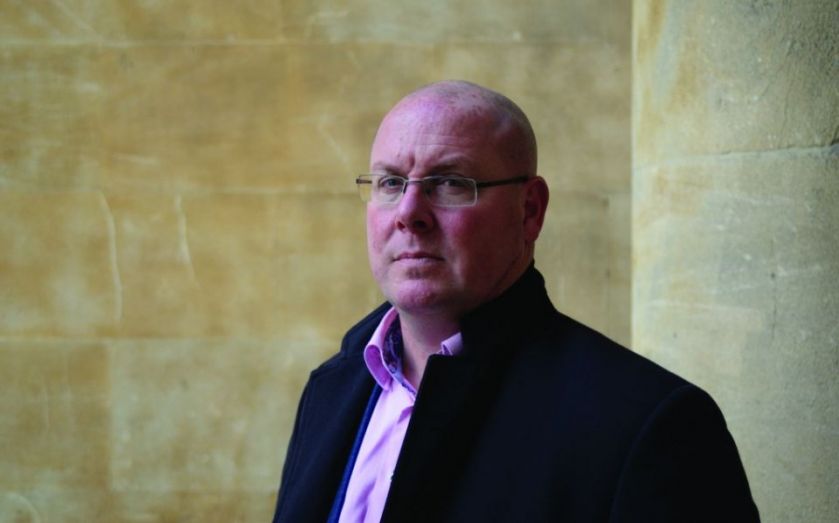Barings’ collapse: The reflections of rogue trader Nick Leeson, the man who crashed a bank

Twenty years on from the collapse of Britain’s oldest merchant bank Barings and the rogue trader responsible for its demise is perched opposite me on a sofa in the rarified Palm Court tea room in the Langham Hotel, sipping tea and eating biscuits.
Dressed in a pink shirt, blue jacket and jeans, the Nick Leeson of 2015 is bigger and more imposing than the rakish figure burnt into the national psyche parading through Singapore airport in handcuffs, or the smiling rogue pictured in Barings’ distinctive gold and blue trading jackets on the cover of his autobiography,
The 47-year-old father of three has just come from an interview at the BBC where he was asked to pose for a snap by a member of staff – a sign of the enduring fascination with the Barings scandal after two decades.
“It’s not as bad as it was years ago,” he says quietly. “I am recognisable with my bald head and the glasses. But I can’t hide away from it. I don’t wear that silly jacket anymore otherwise it would be a lot worse.”

Leeson led through Singapore airport in 1995
Barings Bank, one of the bluest of the City’s blue-blooded institutions, collapsed on 26 February 1995 after Leeson, then its 27-year-old head of derivatives trading in Singapore, lost £827m due to months of unauthorised trading in Asian futures contracts.
He was sentenced to six and half years in prison for fraud in Singapore, serving four and a half years before being released after he was diagnosed with cancer of the colon. Two decades on, the bank he brought down still defines him. “I don’t know what the appropriate level of remorse is, I genuinely don’t,” he says. “You don’t want to wake up every morning and think woe is me, blaming other people.
“At the same time you don’t want to be afraid to look people in the eye so you have to draw the line somewhere. And I don’t know where I drew the line but it’s firmly drawn because otherwise you end in a spiral which ends in depression and I’m not going to do that. I owe too much to my family to do that. I’m not going to do that for anybody.”
As the dust has settled on the collapse of Barings, hindsight has show that Leeson was not solely to blame. The Bank of England’s report into the scandal in 1995 said management were also culpable. He confesses it is likely a similar scandal would have occurred years later with or without him, due to the bank’s incompetence and negligence.
“It was a very poorly run organisation and that wasn’t endemic in the industry at the time,” he says. However, he adds the lack of control and supervision, were “only contributory factors”, to its downfall. “You need the wrongdoing.”
Leeson lives in Ireland now with his wife and kids. His main source of income comes from after-dinner speaking engagements. He has an engagement in Dublin tonight and has just returned from speaking at a conference in Amsterdam. He doesn’t trade anymore – “I don’t want to lose anymore money,” he jokes – but he does still have City friends.

Ewan McGregor playing Leeson on screen
It’s hard to reconcile the self-deprecating Leeson of today with the flash young derivatives trader who rose to a position of prominence at Barings thanks to a flair for making money and reputation as a first class turnaround man.
Leeson, a plasterer’s son from Watford, originally made his name running Barings’ Jakarta office when he was just 22. He made £100m for the bank and was promoted to head its newly minted trading operations in Singapore where he was responsible for a 20-man unit at the age of just 25.
“I thought I could cope with anything. I saw asking for help and advice as a sign of a weakness but financial markets are not about weakness. They’re about being tough and being strong. They’re about having the courage of your convictions and winning.”
Leeson preaches the importance of corporate governance these days, and in the wake of recent trading scandals involving Jerome Kerviel and Kweku Adoboli he says banks should encourage their staff to talk more about their losses and mistakes because “that’s how people learn”.
Eddie George, former Bank of England governor, said in his report he was “unable to determine what the motives were for Leeson’s activities”.
Apart from a sizeable bonus on offer – £450,000 in 1994 – it’s hard to fathom why he pushed the boundaries so far? “I had a very exalted opinion of what success looked like,” he explains. “It was being at the top of the organisation, making all the important decisions, and reaching the absolute top. I also had a fear of failure.” He adds poignantly that his mum always wanted him to achieve more than she did.
“She wanted me to have a better life, a more stable income, a better environment. And I don’t think it was as crass as going from working class to middle class or anything like that, but just to better yourself. I think it’s a very working class mentality.”
After we finish talking, he gets up from the chair. What’s his final message on Barings?
“I don’t blame the lack of controls. But if the controls are there, it can change somebody’s destiny greatly.”